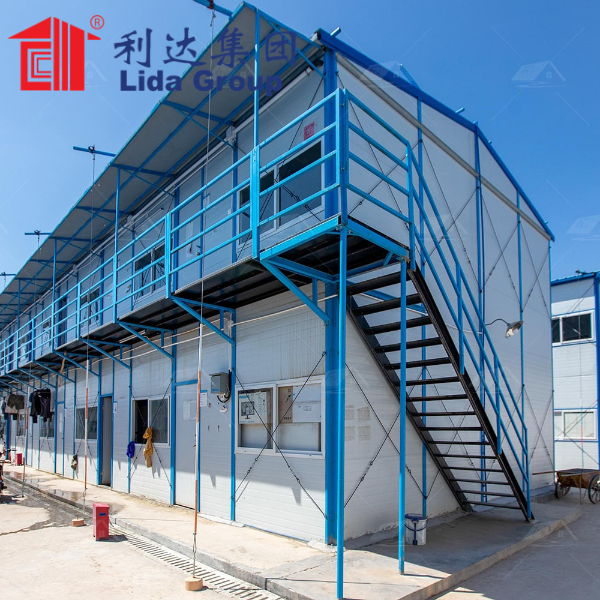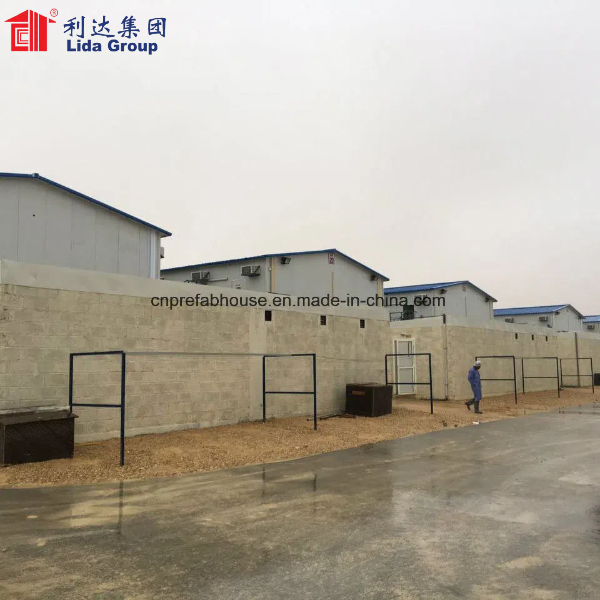In today’s rapidly changing industrial landscape, the need for efficient, cost-effective, and sustainable housing solutions for transient workforces has become increasingly critical. Labor camps are essential for accommodating workers in various sectors, including construction, mining, and agriculture, often in remote locations. Lida Group, a leader in prefabricated housing solutions, has emerged as a pioneer in creating comprehensive labor camps that prioritize the welfare of workers while addressing the unique challenges of temporary housing. This article explores Lida Group’s approach to prefabricated housing in labor camps, focusing on design flexibility, quality, sustainability, and overall worker well-being.
Understanding Labor Camps and Their Importance
The Role of Labor Camps
Labor camps serve as temporary residences for workers who are often deployed to distant job sites. These camps provide essential services and facilities to support workers during their assignments. The quality of housing directly influences worker morale, productivity, and overall job satisfaction. Therefore, investing in well-designed labor camps is crucial for companies aiming to attract and retain skilled labor.
Challenges of Traditional Labor Camp Housing
Traditional labor camp housing often presents several challenges:
- High Construction Costs: Conventional construction methods can be costly and time-consuming, resulting in delayed housing availability.
- Inadequate Living Conditions: Many traditional labor camps fail to provide essential amenities, leading to poor living conditions that negatively affect worker morale.
- Environmental Impact: Traditional construction methods often generate significant waste and have a higher carbon footprint.
- Limited Flexibility: Conventional buildings are typically permanent structures that cannot easily adapt to changing workforce sizes or requirements.
Lida Group: A Leader in Prefabricated Housing Solutions
Company Overview
Founded in 1993, Lida Group has established itself as a prominent player in the prefabricated housing industry. The company specializes in designing and manufacturing modular housing solutions tailored to various sectors, including labor camps. Lida Group’s commitment to quality, efficiency, and sustainability has made it a trusted partner for organizations seeking effective housing solutions.
Mission and Vision
Lida Group aims to provide innovative housing solutions that enhance the living conditions of workers while promoting sustainability. The company’s vision is to create a future where affordable, high-quality housing is accessible to all, contributing to improved worker welfare and productivity.
The Advantages of Prefabricated Housing in Labor Camps
Cost-Effectiveness
One of the primary benefits of prefabricated housing is its cost-effectiveness. By manufacturing units off-site in a controlled environment, Lida Group can significantly reduce construction costs. Key factors contributing to cost savings include:
- Reduced Labor Costs: Factory production minimizes the need for skilled labor on-site, lowering overall labor expenses.
- Shorter Construction Time: Prefabricated units can be assembled in a fraction of the time required for traditional construction, allowing companies to meet urgent housing needs quickly.
- Lower Maintenance Costs: The durable materials used in prefab construction result in lower long-term maintenance expenses.
Speed of Deployment
In industries where time is of the essence, the ability to quickly establish housing for workers is crucial. Lida Group’s prefabricated housing solutions can be deployed rapidly, allowing companies to respond swiftly to immediate housing needs. This speed is particularly beneficial in emergency situations or when projects demand quick scaling.
Quality Control and Durability
Prefabricated houses produced by Lida Group are built in a controlled factory environment, ensuring high-quality standards. This controlled setting reduces the risk of defects and enhances the overall durability of the structures. Additionally, the materials used are designed to withstand harsh environmental conditions, making them suitable for various climates.
Flexibility and Customization
Lida Group’s prefabricated housing solutions offer a high degree of customization. Companies can tailor designs to meet the specific needs of their workforce, including:
- Flexible Layouts: Modular homes can be designed to accommodate various numbers of occupants, with options for single-occupancy or multi-occupancy units.
- Integrated Amenities: Prefab houses can include essential amenities such as kitchens, bathrooms, and communal areas, promoting a higher quality of life for workers.
- Scalable Solutions: As project needs change, prefab units can be easily added or reconfigured, allowing for efficient management of housing resources.
Sustainability
Lida Group prioritizes sustainability in its construction practices. The company’s prefabricated housing solutions incorporate several eco-friendly features:
- Reduced Waste: Factory construction allows for better control over materials, resulting in less waste compared to traditional building methods.
- Sustainable Materials: Lida Group emphasizes the use of eco-friendly materials, further minimizing the environmental impact of its housing solutions.
- Energy Efficiency: Prefabricated houses can incorporate energy-efficient features, such as high-quality insulation and energy-efficient windows, reducing utility costs and environmental footprints.
Enhancing Worker Well-Being
Improving Living Conditions
Lida Group understands that comfortable living conditions are essential for worker well-being. The company’s prefabricated housing solutions are designed with several key elements that enhance comfort:
- Quality of Materials: The use of high-quality construction materials ensures better insulation, ventilation, and overall livability.
- Personal Space: Offering private sleeping quarters allows workers to enjoy their personal space, which is vital for mental well-being.
- Community Spaces: The inclusion of communal areas fosters social interaction among workers, promoting a sense of community and reducing feelings of isolation.
Psychological Benefits of Quality Housing
Research indicates that comfortable living conditions can lead to improved mental health and job performance. By investing in high-quality prefabricated housing, companies can enhance worker satisfaction and reduce turnover rates. Comfortable living environments contribute to higher levels of engagement and productivity.
Case Studies: Successful Implementation of Lida Group’s Prefabricated Housing
Mining Industry
In a remote mining operation, a company faced significant challenges in providing adequate housing for its workforce. Traditional construction methods were impractical due to logistical issues and harsh environmental conditions. Lida Group was brought in to provide customizable prefabricated housing solutions.
The rapid deployment of modular units allowed the mining company to establish a labor camp that included private sleeping quarters and communal living spaces. This improved the quality of life for workers, leading to increased productivity and reduced turnover.
Construction Projects
A large construction firm undertaking a major infrastructure project needed to provide housing for its workers quickly. By utilizing Lida Group’s prefabricated housing solutions, the firm was able to set up a labor camp within weeks. The customizable options allowed for the integration of kitchens, dining areas, and recreation spaces, significantly enhancing the living conditions for workers.
Worker satisfaction improved significantly, resulting in higher levels of engagement and productivity on-site. The flexibility of the prefab houses allowed the firm to adapt to changing workforce sizes throughout the project.
Agricultural Labor Camps
In the agricultural sector, a cooperative sought to provide temporary housing for seasonal workers. Lida Group’s prefabricated houses were deployed, allowing the cooperative to quickly establish housing that could be easily expanded or relocated as needed. The positive impact on worker satisfaction led to increased productivity during peak harvest times.
Addressing Challenges and Considerations
Regulatory Compliance
While Lida Group’s prefabricated housing solutions offer numerous advantages, navigating local building codes and regulations can pose challenges. It is essential for companies to work closely with local authorities to ensure that all units meet necessary compliance standards, facilitating a smoother deployment process.
Initial Investment
Although prefabricated housing offers long-term savings, the initial investment can be a concern for some companies. However, it is crucial to consider the total cost of ownership, including maintenance and energy savings, which often makes prefab housing a financially sound choice.
Cultural Sensitivity
In regions with diverse cultural backgrounds, it is important to consider the needs and preferences of the workforce when designing housing solutions. Lida Group’s flexible designs allow for adaptations that respect local customs and practices, ensuring that living spaces are suitable for all workers.
The Future of Prefabricated Housing Solutions
As the demand for efficient and sustainable housing solutions continues to grow, Lida Group is well-positioned to lead the charge in the prefabricated housing market. Innovations in construction technology, materials, and design practices will further enhance the appeal of these units, making them even more efficient and adaptable.
Technological Advancements
The integration of smart technology into prefabricated housing is an emerging trend. Features such as intelligent climate control, energy management systems, and advanced security measures can improve the living experience for workers while promoting sustainability.
Global Demand
As industries worldwide seek to improve living conditions for transient workers, the global demand for prefabricated housing solutions is expected to rise. Lida Group’s commitment to designing comfortable, functional, and sustainable housing will make it a preferred partner for organizations looking to enhance their labor camps.
Conclusion
Lida Group’s comprehensive approach to prefabricated housing in labor camps represents a significant advancement in the way we address the unique challenges of workforce accommodation. By prioritizing customization, comfort, and sustainability, Lida Group has established itself as a leader in the prefabricated housing market. As industries continue to evolve, the advantages of prefabricated housing will become increasingly evident, paving the way for a future where affordable and comfortable living is accessible to all workers. Embracing Lida Group’s innovative solutions is not just a strategic business decision; it is a commitment to enhancing the quality of life for workers and promoting a more sustainable future in labor management.
Contact Us
Post time: Dec-19-2024


